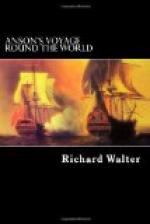This conduct of the Commodore to his prisoners, which was continued without interruption or deviation, gave them all the highest idea of his humanity and benevolence, and induced them likewise (as mankind are fond of forming general opinions) to entertain very favourable thoughts of the whole English nation.
All the prisoners left us with the strongest assurances of their grateful remembrance of his uncommon treatment. A Jesuit, in particular, whom the Commodore had taken, and who was an ecclesiastic of some distinction, could not help expressing himself with great thankfulness for the civilities he and his countrymen had found on board, declaring that he should consider it as his duty to do Mr. Anson justice at all times.
CHAPTER 20. A CLEVER TRICK. WATERING AT QUIBO. CATCHING THE TURTLE.
When we got under sail from the road of Paita we stood to the westward, and in the morning the Commodore gave orders that the whole squadron should spread themselves, in order to look out for the Gloucester; for we now drew near to the station where Captain Mitchel had been directed to cruise, and hourly expected to get sight of him, but the whole day passed without seeing him.
DOLLARS AMONGST THE COTTON.
At night having no sight of the Gloucester, the Commodore ordered the squadron to bring to, that we might not pass her in the dark. The next morning we again looked out for her, and at ten we saw a sail, to which we gave chase, and at two in the afternoon we came near enough her to discover her to be the Gloucester, with a small vessel in tow. About an hour after we were joined by them, and then we learned that Captain Mitchel in the whole time of his cruise, had only taken two prizes, one of them being a small snow, whose cargo consisted chiefly of wine, brandy, and olives in jars, with about 7,000 pounds in specie; and the other a large boat or launch which the Gloucester’s




